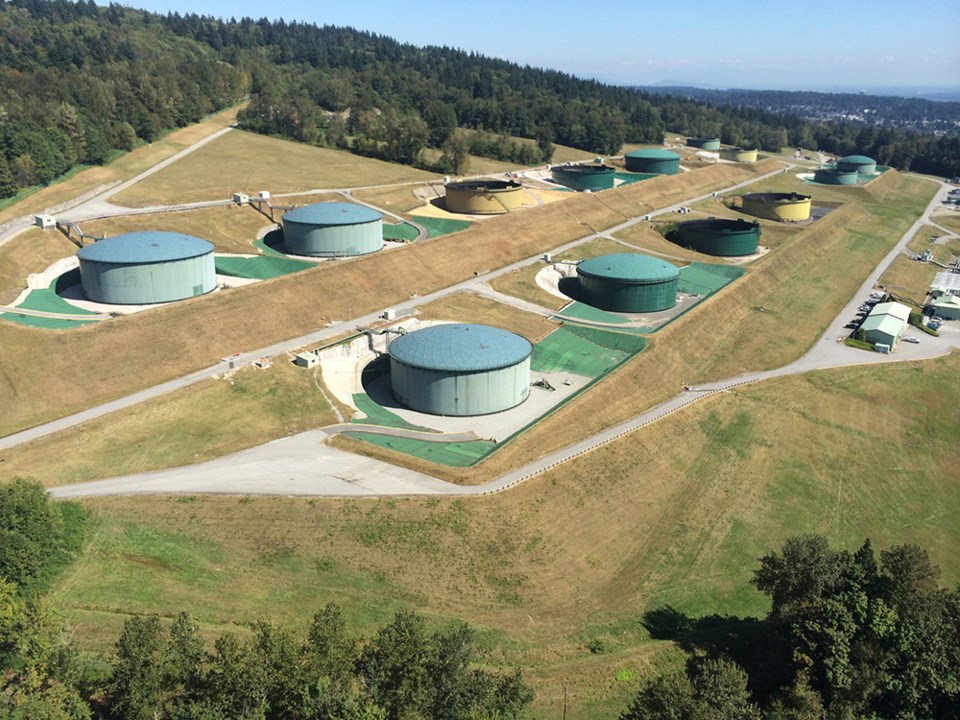*This story has been updated with new information.
Trans Mountain has yet to submit an evacuation plan for the area surrounding the Burnaby terminal, something the City of Burnaby has said the company should have done before the updated tank farm design was approved.
In a submission to the National Energy Board in May, the city argued Trans Mountain underrepresented risks at the tank farm – including vapour clouds and tank boil overs – and made inaccurate assumptions in its risk assessment that may not be possible because of the location of the tank farm. Assuming that people who live on and near Burnaby Mountain can be evacuated before a boilover, for example, is one of these mistakes, according to the city.
“No future consultation or emergency response plan will provide for the opportunity to address risk through tank farm design,” states the May report. “These matters of critical importance to public safety in Burnaby must be addressed prior to consideration of the Burnaby Terminal variance and prior to commencing construction.”
But the National Energy Board ruled Trans Mountain adequately met the two conditions that required it to create updated risk assessments, and to demonstrate how it would respond in the case of a spill or release.
The board also reminded the company that it must file an evacuation plan six months before the pipeline expansion is operational.
This was announced Friday along with the board’s approval of a variance which allows Trans Mountain to reconfigure the new oil storage tanks on Burnaby Mountain. That plan reduces the diameter of five of 14 oil storage tanks, increase space between tanks, and reconfigures the spill containment system, all which are meant to reduce the risk of fire.
The NEB also recognized the city of Burnaby’s concerns about emergency planning and evacuation in a report Friday, but said Trans Mountain's emergency plans, which includes evacuating people who live and work on Burnaby Mountain is case of an emergency, is acceptable.
“In the Board’s view, evacuation of people in advance of a hazardous event represents an acceptable incident management philosophy aligned with industry practice,” reads a letter sent to the company on Friday.
Trans Mountain has argued that its risk assessment is industry-standard and appropriate, something NEB agrees with.
The NEB also stated that Trans Mountain’s proposed plans to alleviate issues following an unintentional spill or release is adequate. They also noted the pipeline’s overall capacity for the spill containment exceeds B.C.’s fire code requirements.
Trans Mountain issued a statement on Monday:
"Our top priority is the safety of the communities where we operate and Trans Mountain understands the most critical and responsible emergency management strategy is to prevent an incident from occurring at all. Over the past 65 years, we’ve developed a mature suite of programs that maximize pipeline safety by focusing on preventing pipeline failures. In the case of an emergency, we have detailed emergency response procedures and trained professionals who are prepared to quickly respond to any type of incident anywhere along the pipeline system.
"We’ve developed a comprehensive Emergency Management Program based on a combination of regulatory compliance, operational need, industry best practices and lessons learned through regular exercises and actual incidents. As part of our ongoing commitment to safety and emergency preparedness, our emergency response plans are continually reviewed, revised, practiced and communicated with first responders all along the pipeline system. We assess new and emerging practices to ensure we are applying best available technologies to protect our pipeline and terminals.
"Trans Mountain is building on our existing program by developing an enhanced Emergency Management Program that reflects the added scope of the Expansion Project. The enhanced program is being developed through consultation with local stakeholders. The emergency management consultation plan ... was filed in June 2017 and found to be in compliance by the NEB. It describes the approach to consult with stakeholders, including municipalities, fire departments and other first responders, and provincial agencies, and with Aboriginal Groups."



